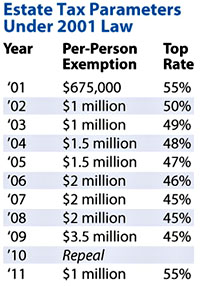Ezra Klein writes about the estate tax debate today, and he mentions all the usual talking points: it went down to zero this year as part of a political ploy by  Republicans, it only affects 2% or less of estates, repeal is heavily supported by the ultra-rich, etc. etc. This is all true.
Republicans, it only affects 2% or less of estates, repeal is heavily supported by the ultra-rich, etc. etc. This is all true.
And yet, something about the estate tax debate still eludes me. Polls routinely show that a substantial majority of people favor higher income taxes on the rich. But polls also show that a substantial majority of people favor repeal or reduction of the estate tax. Here’s one that says 68% favor total repeal. Here’s another in which preventing an increase in the estate tax ranks as the public’s highest concern for the lame duck session. And of course, there’s Monday’s ABC poll showing that 52% favor a reduction in the estate tax.
The wording in these polls differs, and there’s no telling how many people understand what the current rules are or who the estate tax primarily affects. Still, there’s a pretty consistent thread here: generally speaking, a pretty sizeable majority of the country favors the idea of repealing the estate tax or, at the least, keeping it low.
I’m not sure what to think of this. It’s possible, of course, that the public has simply been brainwashed by over a decade of focused estate tax propaganda from representatives of the rich. It’s also possible that most people have no idea that the estate tax only hits the extremely wealthy in the first place. But I don’t think that’s the whole story. Like it or not, I think that most people simply have an instinctive feeling that you should be able to bequeath your money to whoever you want. If most bequests went to, say, political parties or yacht harbor upkeep groups, things might be different. But as long as most bequests go to family members, you’re dealing with a very deep, very primitive protective instinct that most people sympathize with no matter how rich you are. After all, I feel that, and I don’t even have kids.
At least, that’s my guess. But I’d really like to see some deeper research on this. How have attitudes changed over time? How do they differ between countries? And when you dig deeper, what do people actually say about their feelings on rich people and their estates? Until we understand this, I feel like proponents of higher estate taxes are flying a bit blind.














